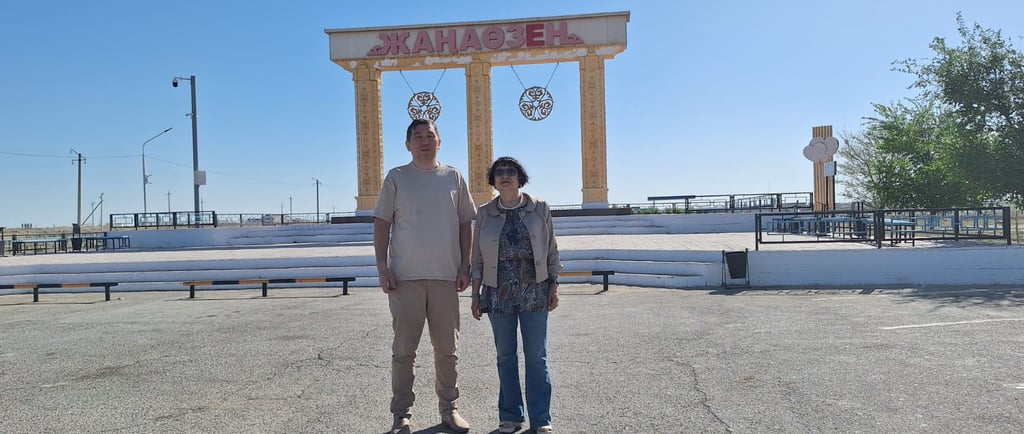Exploring Innoker's Research on Single-Industry Towns in the Mysl Journal
Experts from Innoker have published two analytical articles in the leading national journal Mysl
8/5/20253 min read


Innoker experts proudly announce the publication of two analytical articles in the national socio-political journal Mysl (Issues No. 6 and No. 7, 2025), titled: “Single-Industry Towns: Problems and Prospects.”
The research, conducted by Innoker experts Rizvangul Sadykova and Nurbek Achilov, is based on fieldwork carried out in Mangystau Region (Kazakhstan) and the Republic of Tatarstan (Russia), as part of the project “Zhanaozen – My City of the Future.” During the study, the experts visited the cities of Zhanaozen, Kenderli, Almetyevsk, Nizhnekamsk, Naberezhnye Chelny, and Kazan.
A comparative analysis was conducted on the development of key single-industry towns, such as Zhanaozen, Kenderli, and Almetyevsk, with a focus on:
identifying new indicators for sustainable development of Kazakhstan’s monotowns;
analyzing international and local practices of economic transformation;
proposing strategies to diversify employment and reduce social tension;
assessing the potential for creating industrial zones and special economic territories.
🗣 “Almetyevsk has shown how smart cooperation between business and government can turn an oil city into a model of social stability,” notes Rizvangul Sadykova, international law expert.
Special attention is paid to Zhanaozen as a key center of socio-economic transformation in Mangystau. The articles also address critical issues of regional development, migration, employment, unemployment rates, human capital, and the need for a new planning approach to Kazakhstan's economy. The report has been presented to the Ministry of Labor and Social Protection, Ministry of National Economy, the CSIC, and other government agencies for use in policy development.
🗣 “Regions can only become growth points if we shift from resource dependency to investments in human capital, infrastructure, and knowledge,” says Nurbek Achilov, economic analyst.
Innoker is confident that the presented approaches and recommendations will contribute to building a more sustainable regional development model. The company will continue its expert and scientific efforts to support government reforms and socio-economic progress.
🏙️ Research Highlights:
📍 Case studies: Zhanaozen, Kenderli, Almetyevsk
📈 International and domestic experience comparison
🧭 New sustainable development indicators
🛠 Practical recommendations for government
🧑🎓 “Youth Relocation Program” proposal for attracting specialists
🔗 Access the full articles in Mysl Journal, June & July 2025 editions:
Part 1: mysl.kazgazeta.kz/news/16424
Part 2: mysl.kazgazeta.kz/news/16444
Single-industry towns have long been a focal point for researchers, economists, and policymakers, primarily due to their unique socio-economic dynamics. These towns, often reliant on a single industry, face distinct challenges and opportunities. In this blog post, we will delve into the recent research presented by Innoker regarding these specialized urban areas, as documented in the Mysl journal.
Innoker has undertaken a comprehensive analysis of single-industry towns, exploring their economic structures, social fabrics, and the environmental impact of their mono-industrial nature. The key findings highlight a troubling dependency on one primary economic activity, which often correlates with unemployment and social instability during industry downturns.
The research underscores that businesses in these towns must diversify to foster resilience against market fluctuations. Furthermore, Innoker's study discusses the need for strategic planning and policy adjustments to create supportive infrastructures assisting these communities in transitioning beyond their traditional industries.
The implications of Innoker's research extend beyond academic curiosity; they serve as a call to action for local governments and stakeholders. By understanding the nuanced dynamics at play in single-industry towns, policymakers can develop interventions that promote economic diversification while enhancing the quality of life for residents.
Additionally, the study emphasizes the importance of engaging the community in these efforts, advocating for education and training programs tailored to equip residents with skills relevant to evolving industries. This approach not only addresses current challenges but also prepares these towns for future economic shifts.
In summary, Innoker's research contributes valuable insights into the complexities faced by single-industry towns, encouraging a reevaluation of current strategies towards sustainable growth and community well-being. As the landscape of industry continues to evolve, so too must the approaches we adopt in addressing the needs of these unique urban environments.
